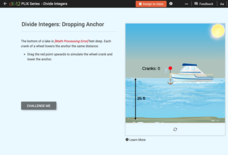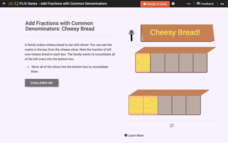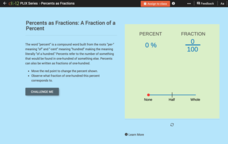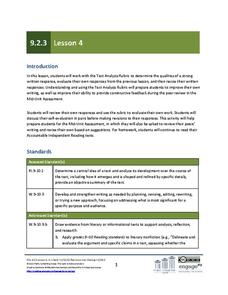EngageNY
Describing Variability Using the Interquartile Range (IQR)
The 13th instructional activity in a unit of 22 introduces the concept of the interquartile range (IQR). Class members learn to determine the interquartile range, interpret within the context of the data, and finish by finding the IQR...
National Council of Teachers of Mathematics
Tidal Waves
Periodically ship the class a trigonometric application. Pupils model the level of water in a port. Using their models, learners determine the times that a ship can safely navigate into and out of the port, along with determining other...
PBS
Ken Burns: Jackie Robinson Living in Jim Crow America
Your class members may know that Jackie Robinson was the first African American man to play Major League Baseball, but they may not be aware of his efforts to achieve social justice. A clip from Ken Burns: The Jackie Robinson Collection...
CK-12 Foundation
Integer Division: Dropping Anchor
An interactive made up of five questions challenges mathematicians to divide integers and reflect on division properties. A moveable anchor aids in problem-solving. Question types include multiple-choice, true or false, and discussion.
CK-12 Foundation
Whole Number Exponents: Building Blocks
Five questions make up an interactive all about whole-number exponents. Movable building blocks create a visual tool to aide mathematicians in answering multiple-choice and true or false problems. The interactive ends with a discussion...
CK-12 Foundation
Sums of Fractions with Like Denominators: Cheesy Bread
Five questions make up an interactive all about adding fractions with like denominators. Mathematicians answer multiple-choice problems and an open-ended question using a fraction model that resembles sliced bread. The practice ends with...
CK-12 Foundation
Percents as Fractions: A Fraction of a Percent
Five questions make up an interactive all about percents and fractions. Mathematicians answer multiple-choice and fill in the blank problems with help from a tool that converts percents to fractions using a sliding bar. An open...
CK-12 Foundation
Values Written as Powers: Binary Numbers 17 to 24
Boost mathematicians' proficiency of binary numbers 17 to 24 with an interactive comprised of six questions—multiple-choice, true or false, and a discussion. A color-coded table reveals binary equivalents to aid in the problem-solving...
Aquarium of the Pacific
Sensational Sharks
Pray that you are not the prey of sharks! The class watches a video and a webcam on sharks and make observations about the different types of sharks. Learners compare two sharks and list their similarities and differences. They then...
Overcoming Obstacles
Getting Organized
A lesson challenges scholars to get organized. A thoughtful discussion sheds light on time management and the benefits of staying organized. Learners then reflect on their current time management skills, organize notebooks or binders,...
Overcoming Obstacles
Learning How You Learn Best
Scholars think of a special place, then represent that place through pictures or written words— a poem, song, or short story. Peers show off their organizational skills by reviewing their binders and notebooks, comparing strategies, and...
Scholastic
Owl Moon Teaching Plan
Capture the engagement of young readers with this collection of activities based on Jane Yolen's book, Owl Moon. Following a shared reading of this children's story, the class explores the geography of the American Northeast, creates...
EngageNY
Grade 9 ELA Module 2, Unit 3, Lesson 4
What are the qualities of a strong written response to a prompt? Class members use the provided text analysis rubric to self-assess their responses to their homework assignments to prepare for the mid-unit assessment.
Give and Let Live
Blood and Transplant: Bone Marrow
What causes someone to need a bone marrow transplant? Fascinate your class with a activity on the intricate task of procuring bone marrow for patients suffering from illnesses like leukemia. The fourth and final installment in a series...
Fluence Learning
Writing a Narrative: How Bear Lost His Tail
After reading the first, second, and third parts of "How Bear Lost His Tail", third grade writers answer questions about the story by completing a series of options, including discussion points. Then, they begin to plan a new narrative...
CK-12 Foundation
Modern Genetics
Genetic counselors advise their clients on the chance of passing specific diseases on to their children. Pupils learn about genotypes, phenotypes, and genetics in the lesson. Matching activities, multiple-choice questions, and a...
Other popular searches
- Class Discussion Plans
- Fishbowl Class Discussion
- Class Discussion Topics
- Whole Class Discussion
- Class Discussion Rubrics
- Science Class Discussion
- History Class Discussion
- Class Discussions Hiroshima
- Leading Class Discussions

















